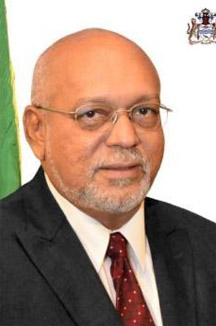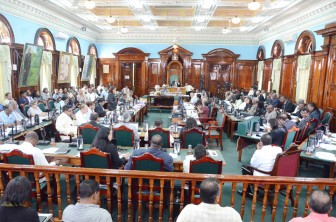There was little that was extraordinary or even either eye-catching about President Donald Ramotar’s February 10th address to the National Assembly though it never seemed as though the Republic’s seventh Executive President set out to deliver a rousing speech to the Parliament anyway.
The political opposition, however, appeared to anticipate more of the President than a mere ceremonial appearance in the National Assembly. After he had made his presentation some opposition functionaries responded by suggesting that what he had to say had fallen short of what they might have expected. From the President’s standpoint, however, he clearly succeeded in delivering his government’s political message to a National Assembly in which the opposition holds a one-seat majority.

The message was delivered in a single line in a presentation which, on the whole, could well have been a good deal briefer. “My administration will not be held ransom to intractable postures.” It is this, above all else that concerns the President about a National Assembly the composition of which reflects a sharp departure from what obtained since the country became independent in 1966. Since the convening of the Republic’s Tenth Parliament the ruling PPP/C has done little to disguise its unease over the likelihood that the passage of legislation will no longer benefit from the automaticity that it had enjoyed in the past. The current status quo has positioned APNU and the AFC and the AFC to use its majority to stymie the passage of legislation. That is not a comforting thought for President Ramotar and he clearly felt that it would have been politically remiss of him not to make that point.
The President’s blunt declaration regarding what he says is the administration’s hoped-for “maturity and inertia if we are to avoid political gridlock” was preceded by an expression of hope that “patience, forebearance and reasonableness” will prevail though the problem is – as it has always been – that the government and the opposition are probably likely to differ frequently on what constitutes those virtues.
As the political brouhaha that preceded the eventual election of a Speaker of the National Assembly demonstrated the “differences” in the divided House to which the President referred in his address are not only real but, in some cases, deep. More than that the past few weeks have already bared a combative environment in the House in which, once horns are locked, there is no inclination on any side to back away.

From the opposition benches have already come expressions of doubt regarding the President’s undertaking that his government has “the political will” to make the National Assembly work rather than have it sink into the failures that have occurred elsewhere and even if the President is correct in his assertion that the Parliament, as a whole, has the capacity to face and surmount the challenge of an opposition majority in the National Assembly there is already sufficient evidence of a lack of trust in the broader political arena to raise doubts as to whether the various sides can find a reassuring modus vivendi in the National Assembly.
I am convinced that we have the capacity to rise to this challenge. I am satisfied that we are capable of demonstrating to the Guyanese nation that while political competition and diversity are essential in a democracy, they should not foreclose on the possibilities for compromise and consensus in the way we do business.
Indeed, the make-up of this new parliament dictates that we seek consensus and compromise and should resist the temptation to believe that any party can ride rough shod over another. Any such attempt may see us missing the historical opportunities that this new composition offers. I urge that we put the interest of our people first. I urge that we work assiduously to find common ground within and outside of this hallowed chamber.
“Within my administration there exists the political will to do so. My government has already committed to regular engagements with the parliamentary parties. Through these engagements I hope that we can continue to nurture political trust and create an enabling climate for consensus- building. It was disappointing that we did not find consensus in the election of the Speaker of the Assembly.
“However, I am still optimistic that seeking agreements by dialogue is still the best way forward. I also believe that working in this Parliament can contribute in building trust that is so important for our political culture.”




